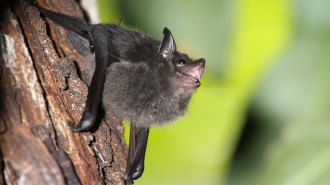Audio
Sign up for our newsletter
We summarize the week's scientific breakthroughs every Thursday.
-
 Health & Medicine
Health & MedicineWelcome to The Deep End, a new podcast about brain implants and depression
This new six-part podcast follows the lives of people with severe depression who volunteered for deep brain stimulation.
-
 Animals
AnimalsBottlenose dolphin moms use baby talk with their calves
When their babies are near, bottlenose dolphin moms modify their signature whistles, similar to human parents speaking in baby talk.
-
 Plants
PlantsStressed plants make ultrasonic clicking noises
Tomato and tobacco plants emit high frequency sounds, which could one day find a use in agriculture, as a way to detect thirsty crops.
By Meghan Rosen -
 Health & Medicine
Health & MedicineAt a long COVID clinic, here’s how doctors are trying to help one woman who is struggling
As more people experience long-term health problems from COVID-19, long COVID clinics try to help patients manage symptoms, like brain fog and fatigue.
By Meghan Rosen -
 Humans
HumansHere’s where jazz gets its swing
Swing, the feeling of a rhythm in jazz music that compels feet to tap, may arise from near-imperceptible delays in musicians’ timing, a study shows.
By Nikk Ogasa -
 Planetary Science
Planetary ScienceMars has two speeds of sound
High-pitched clacks from a laser on NASA’s Perseverance rover zapping rocks traveled faster than the lower-pitched hum of the Ingenuity helicopter’s blades.
By Liz Kruesi -
 Animals
AnimalsThese baby greater sac-winged bats babble to learn their mating songs
Greater sac-winged bat pups babble their way through learning their rich vocal repertoire, similar to how human infants babble before speaking.
-
 Archaeology
ArchaeologyHumans made a horn out of a conch shell about 18,000 years ago
Ancient find may have sounded off during rituals in a cave adorned with wall art.
By Bruce Bower -
 Animals
AnimalsNaked mole-rat colonies speak with unique dialects
Machine learning reveals that these social rodents communicate with distinctive speech patterns that are culturally inherited.
-
 Animals
AnimalsA sparrow song remix took over North America with astonishing speed
A variation on the white-throated sparrow’s song spread 3,300 kilometers in just a few decades.
By Jack J. Lee -
 Animals
AnimalsSouthern right whale moms and calves may whisper to evade orcas
Mother-calf whale pairs call to each other quietly to stay in touch while avoiding attracting the attention of predators, a study suggests.
-
 Ecosystems
EcosystemsMoonlight shapes how some animals move, grow and even sing
The moon’s light influences lion prey behavior, dung beetle navigation, fish growth, mass migrations and birdsong.
By Erin Wayman